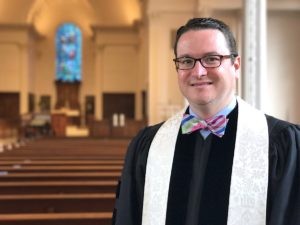Behind every canceled church gathering in the age of the novel coronavirus is likely to be a faithful-though-frazzled pastor.
Their stress emanates from having to decide between the physical and spiritual health of the congregation they serve.
“Part of our calling of loving each other is that we make hard choices to protect vulnerable people,” said Elizabeth Mangham Lott, senior pastor at St. Charles Avenue Baptist Church in New Orleans.

Elizabeth Mangham Lott
Having to pick and choose between those life-affirming needs, she said, has cost her plenty of sleep. But she decided to postpone in-person worship to keep church members from worrying about coming to church.
“When people are so stressed out and trying to make the right decisions, it didn’t seem fair to put this decision back on them as well,” Lott explained.
But giving the coronavirus a wide berth is about much more than canceled worship services. Lott and other ministers anticipate potentially far-reaching repercussions for their congregations, church members and their families and their surrounding communities.
Missed fellowship could devastate already isolated and lonely people, such as the elderly and those suffering from depression.
People living in poverty and homelessness will also be severely impacted as clothes closets, feeding ministries and other social-needs ministries are shuttered.
‘Luckily folks understand’
“It is worrisome because it points to a larger issue that those without the wherewithal to manage a health crisis like this are most vulnerable,” said Daniel Glaze, pastor of River Road Church, Baptist, in Richmond, Virginia.
Glaze and his congregation saw that first-hand last weekend when a meal-packing event they were to host was canceled by the organizing nonprofit. Up to 20,000 emergency meals are typically packed during the effort the church hosts twice a year.
While understandable, the cancellation causes concern, Glaze said. “It pained us to think someone might not get a meal even though we felt it was the right thing to cancel.”
It points to the dilemma religious leaders and communities are facing, he added. “We don’t want, out of an abundance of caution, for world situations to get worse.”

Daniel Glaze
And the impact of worship held only online – which his church did Sunday – should not be discounted, Glaze emphasized. “Worship is the most important thing we do together. If we stop doing that, we would no longer be the church.”
That impact will be felt in pastoral care ministries, he noted, as home-bound persons, nursing home residents and hospital patients go without in-person visits.
“A lot of our pastoral care is taking place on the phone and via email notes,” he said. “I think we’re just doing the best we can and luckily folks understand.”
Dilemmas abound
Those dilemmas also are being experienced by the populations churches and other ministries seek to serve, said Joshua Hearne, a leader of Grace and Main, an intentional Christian community that addresses housing insecurity, hunger and poverty.

Joshua Hearne
Many in those situations already are unemployed or under-employed, lack health insurance or have compromised immune systems, Hearne said. So, despite being especially vulnerable to infection, these persons are compelled to stand in lines hoping to find jobs, food and clothing.
“If they have to wait in line for food or at a clothing closet, that creates this additional source of potential infection,” he said.
Churches that suspend in-person ministries could still help by paying rents, utility bills and other expenses of individuals in these most vulnerable situations, Hearne said. It’s an approach that smaller, intentional communities use routinely.
“We make a promise to them that they will be able to pay their rent, to have food and to pay for medication,” he said. “Imagine if this was something some of our larger congregations were able to do in the coming days and months.”
Challenging assumptions
There are signs that churches are embracing technological innovation to address unprecedented challenges to fellowship and discipleship presented by the pandemic.
“I’m seeing some creative things rising up already,” said Mark Tidsworth, a church consultant and president of Pinnacle Leadership Associates, based in South Carolina.
Congregations with little or no previous online presence are jumping into video conferencing to offer Sunday school, daily devotionals and Bible studies.

Mark Tidsworth
“One church is having a youth Zoom gathering and a family Zoom gathering,” he said. “That’s pretty cool.
“I also see some churches making changes they already wanted to make, and this is pushing them to go ahead and make the leap.”
Those include live-streaming programs to connect with elderly members, webinars for clergy conferences and swapping online for print bulletins and newsletters.
“There is a lot of innovative technology that we are getting pushed to use and will become part of our lives after the virus is gone,” he said.
On a deeper level, the coronavirus health crisis is forcing churches to take stock of their identity and mission, Tidsworth added.
“Right now, we have to ask, what does the church look like in a coronavirus environment?”
It’s a topic Lott said she, her leadership team and congregation are grappling with in New Orleans.
“Some of the bigger questions are, what do we think is really happening in worship? And is worship the only place where God shows up?” she said.
“It’s an opportunity for us to challenge some of our assumptions and to stretch ourselves.”
EDITOR’S NOTE: BNG is committed to providing timely and helpful news and commentary about ways Christians and churches are responding to the coronavirus pandemic. Look for the hashtag #intimeslikethese. You can also use this form to help us identify compelling stories of faith and ministry in these challenging times.
Related news:
Coronavirus ripples turn to waves for faith-based groups
For missionaries, coronavirus creates ‘an interesting moment in plagues and pestilence’
Related commentary:
Molly T. Marshall | Making wise and courageous choices amid the best and worst of times | #intimeslikethese
Rebekah Gordon | As COVID-19 spreads, Millennial bashing and other blaming is unhelpful and un-Christlike
John Jay Alvaro | An urgent appeal to my fellow ministers and other religious leaders: Suspend all public gatherings NOW
Cody Sanders | Church and the coronavirus: practicing compassion and care even as we take precautions
Corey Fields | We’ve got plenty to be afraid of these days. So why does the Bible tell us not to fear?
